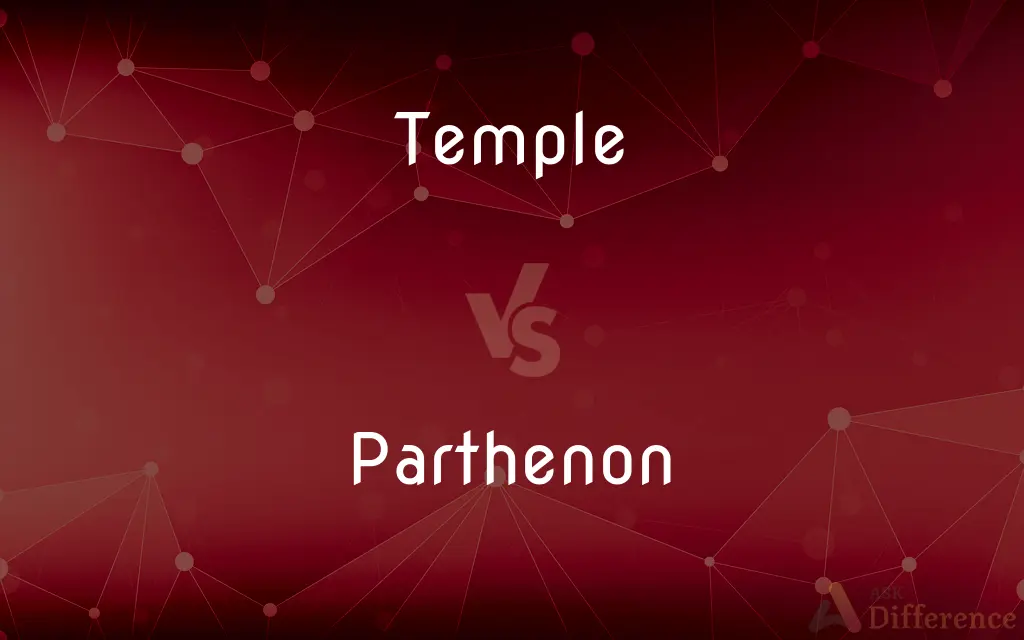Temple vs. Parthenon — What's the Difference?

Difference Between Temple and Parthenon
ADVERTISEMENT
Compare with Definitions
Temple
A temple (from the Latin templum) is a building reserved for spiritual rituals and activities such as prayer and sacrifice. Religions which erect temples include Hinduism, Buddhism, Sikhism, Jainism, Christianity (whose temples are typically called churches), Islam (whose temples are called mosques), Judaism (whose temples are called synagogues), and ancient religions such as the Ancient Egyptian religion.
Parthenon
The Parthenon (; Ancient Greek: Παρθενών, Parthenṓn, [par.tʰe.nɔ̌ːn]; Greek: Παρθενώνας, Parthenónas, [parθeˈnonas]) is a former temple on the Athenian Acropolis, Greece, dedicated to the goddess Athena, whom the people of Athens considered their patroness. Construction started in 447 BC when the Athenian Empire was at the peak of its power.
Temple
A building devoted to the worship of a god or gods.
Parthenon
A temple dedicated to the goddess Athena, built on the acropolis at Athens between 447 and 432 BC and considered one of the finest examples of Doric architecture.
Temple
A group of buildings in Fleet Street, London, which stand on land formerly occupied by the headquarters of the Knights Templar. Located there are the Inner and Outer Temple, two of the Inns of Court.
ADVERTISEMENT
Parthenon
A celebrated marble temple of Athena, on the Acropolis at Athens. It was of the pure Doric order, and has had an important influence on art.
Temple
The flat part of either side of the head between the forehead and the ear
A man with curly hair greying at the temples
Parthenon
The main temple of the goddess Athena; built on the acropolis in Athens more than 400 years B.C.; example of Doric architecture
Temple
A device in a loom for keeping the cloth stretched.
Temple
A building dedicated to religious ceremonies or worship.
Temple
Temple Either of two successive buildings in ancient Jerusalem serving as the primary center for Jewish worship.
Temple
(Judaism) A synagogue, especially of a Reform congregation.
Temple
Mormon Church A building in which the sacred ordinances are administered.
Temple
Something regarded as having within it a divine presence.
Temple
A building used for meetings by any of several fraternal orders, such as the Freemasons.
Temple
A building reserved for a highly valued function
The library, a temple of learning.
Temple
Temple Either of two groups of buildings in London, the Inner Temple and the Middle Temple, that house two of the four Inns of Court and that occupy the site of a complex used by the medieval Knights Templars.
Temple
The flat region on either side of the forehead.
Temple
Either of the sidepieces of a frame for eyeglasses that extends along the temple and over the ear.
Temple
A device in a loom that keeps the cloth stretched to the correct width during weaving.
Temple
A house of worship, especially:
Temple
A house of worship dedicated to a polytheistic faith.
The temple of Zeus was very large.
Temple
(Judaism) synagogue, especially a non-Orthodox synagogue.
How often do you go to temple?
Temple
(Mormonism) As opposed to an LDS meetinghouse, a church closed to non-Mormons and necessary for particular rituals.
Temple
(in Japan) A Buddhist monastery, as opposed to a Shinto shrine.
Temple
A meeting house of the Oddfellows fraternity; its members.
Temple
(figurative) Any place regarded as holding a religious presence.
Temple
(figurative) Any place seen as an important centre for some activity.
A temple of commerce;
A temple of drinking and dining
Temple
(figurative) Anything regarded as important or minutely cared for.
My body is my temple.
Temple
(figurative) A gesture wherein the forefingers are outstretched and touch pad to pad while the other fingers are clasped together.
Temple
(anatomy) The slightly flatter region, on either side of the human head, behind of the eye and forehead, above the zygomatic arch, and forward of the ear.
Temple
(ophthalmology) Either of the sidepieces on a set of spectacles, extending backwards from the hinge toward the ears and, usually, turning down around them.
Temple
(weaving) A contrivance used in a loom for keeping the web stretched transversely.
Temple
(transitive) To build a temple for; to appropriate a temple to; to temple a god
Temple
A contrivence used in a loom for keeping the web stretched transversely.
Temple
The space, on either side of the head, back of the eye and forehead, above the zygomatic arch and in front of the ear.
Temple
One of the side bars of a pair of spectacles, jointed to the bows, and passing one on either side of the head to hold the spectacles in place.
Temple
A place or edifice dedicated to the worship of some deity; as, the temple of Jupiter at Athens, or of Juggernaut in India.
Temple
The edifice erected at Jerusalem for the worship of Jehovah.
Jesus walked in the temple in Solomon's porch.
Temple
Hence, among Christians, an edifice erected as a place of public worship; a church.
Can he whose life is a perpetual insult to the authority of God enter with any pleasure a temple consecrated to devotion and sanctified by prayer?
Temple
Fig.: Any place in which the divine presence specially resides.
Know ye not that ye are the temple of God, and that the spirit of God dwelleth in you?
The groves were God's first temples.
Temple
A building dedicated to the administration of ordinances.
Temple
A local organization of Odd Fellows.
Temple
To build a temple for; to appropriate a temple to; as, to temple a god.
Temple
Place of worship consisting of an edifice for the worship of a deity
Temple
The flat area on either side of the forehead;
The veins in his temple throbbed
Temple
An edifice devoted to special or exalted purposes
Temple
(Judaism) the place of worship for a Jewish congregation
Share Your Discovery

Previous Comparison
Kanbun vs. Kanji
Next Comparison
Leading vs. Heading














































